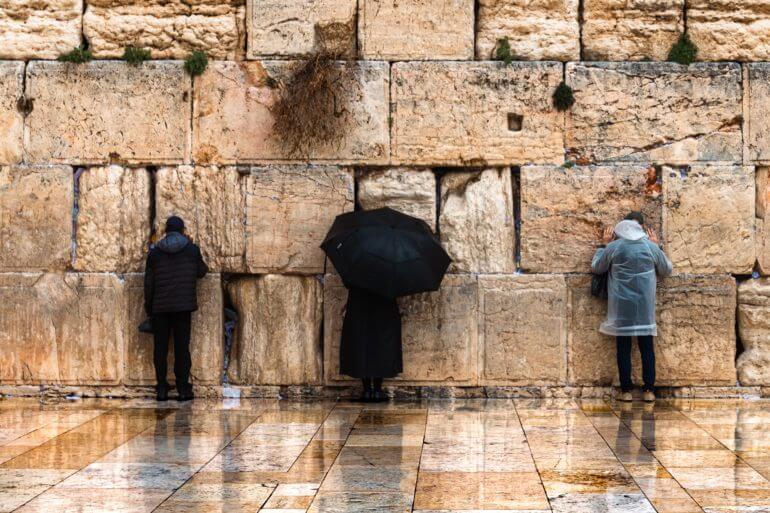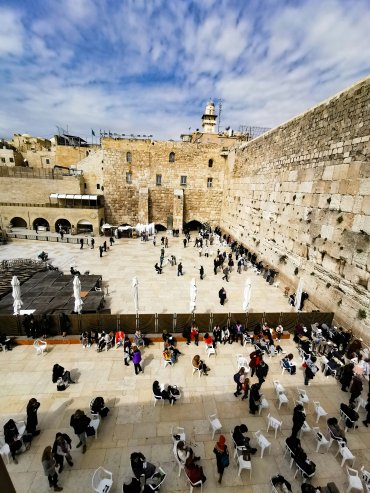
Did the Jewish People Have Any Pre-Battle Prayer in Biblical Times?
Dear Jew in the City,
Did the Jewish people have any pre-battle prayer in biblical times?
Best,
Asher
Dear Asher,
Thanks for your question. Before I answer it, I’d like to address prayer more generally.
I once heard a rabbi say that we shouldn’t take Israel’s battles against Muslim countries lightly. This is because we may daven three times a day, but our cousins from Yishmael’s side of the family pray five times a day!
I suspect you’ve also heard the aphorism about there being no atheists in foxholes.
With such thoughts – and many others – equating prayer with success in battle floating around in the ether, you’d think that of course there was a pre-battle prayer in Biblical times. And there may have been. But I’ve never heard of one.
Let me tell you what we did have. We had the meshuach milchama – a kohein who was “anointed for battle.”
This is a mitzvah in the Torah: Deuteronomy 20:2 tells us that “…the kohein shall approach and speak to the nation.” Generally speaking, the kohanim, who served as spiritual leaders, were to live lives dedicated to peace. In this instance, however, the kohein designated meshuach milchama was to inspire the troops prior to battle.
The Rambam, in Hilchos Melachim chapter 7 (halachos 1-3) details the procedure of the meshuach milchama. First, the selected kohein was anointed with the special anointing oil described in the Torah. He then addressed the troops twice.
The meshuach milchama delivered two messages. His main message was the words of encouragement that are recorded in Deuteronomy 20:3-4:
“Listen, Israel: today you are about to go to battle against your enemies. Don’t be faint-hearted and don’t be afraid. Don’t panic and don’t break rank in front of them. Hashem your God is the One accompanying you to fight your enemies for you, to deliver you.”
He also informed the troops that the following were exempt from battle: one who built a new house but did not yet move into it, one who planted a vineyard but did not yet harvest it, and one who betrothed a woman but did not yet consummate the marriage (ibid., 5-7).
First, the meshuach milchama spoke to the troops at the border, as they were preparing to depart. The second time he addressed them was after they had assumed their positions for battle. On the second occasion, he spoke from an elevated spot.
The charge not to be afraid was repeated by another kohein, and the list of exempted personnel was repeated by an officer of the army, who added that cowards were also exempt, as they would only dishearten the other troops. (Those exempted from battle might have to perform administrative duties depending on the type of war being fought.)
The reason for this mitzvah, according to the Sefer HaChinuch, is because soldiers need encouragement. Who better to provide it than one of their spiritual leaders?
So while I assume that soldiers prayed before battle – either individually or in groups – that would have been a grassroots effort. It’s just something that people naturally do in such circumstances. (No atheists in foxholes, remember?) We’re not told about such prayers, but we see people pray on plenty of other occasions, so it’s a reasonable assumption that they did so before battle as well. (There’s a general mitzvah to pray in times of danger and trouble – Deut. 10:20 as explained by the Ramban – and pre-battle certainly counts.)
I would like to share with you an incident from Joshua chapter 3. When Joshua was standing outside Jericho on the eve of that famous battle, he was confronted by an angel with a drawn sword. (A similar thing happened to Balaam, which is not a great precedent.) The angel symbolically informed Joshua that he had been neglecting his spiritual obligations. Failing to perform them would impede the conquest of the land, which required God’s Divine providence. (Let’s face it – the odds would be against the Jews if we had to rely on nature alone!) The Talmud in Megillah (3a) identifies the primary problem as bitul Torah – neglecting Torah study. Joshua immediately rectified the problem.
We naturally connect battle with prayer because, as mentioned, these two things just intuitively go together. But we mustn’t overlook our Torah study and mitzvah observance. Israel relies on Divine providence and we need to employ every spiritual weapon in our arsenal.
Sincerely,
Rabbi Jack Abramowitz
Educational Correspondent
Follow Ask Rabbi Jack on YouTube
If you found this content meaningful and want to help further our mission through our Keter, Makom, and Tikun branches, please consider becoming a Change Maker today.








1 comment
Sort by
Of course Jews pray before they go to war! That’s what our father Yaakov, Jacob, did when Esav was coming with an army of 400 to kill him. He prayed, sent gifts and prepared for war. He hoped the first two would work and he wouldn’t have to fight.
And modern day Israel likewise sends gifts to try to avoid war at all costs. Israel pours billions a year into Gaza hoping that the Palestinians will take the money, be normal and, yeah, be normal. I mean which normal person raises their kids to hope to blow themselves up while murdering innocent people so they can “go up to heaven and rape 72 virgins”? Does that sound normal?
So, no, the gifts haven’t really worked unfortunately.
We’re down to prayer and war.